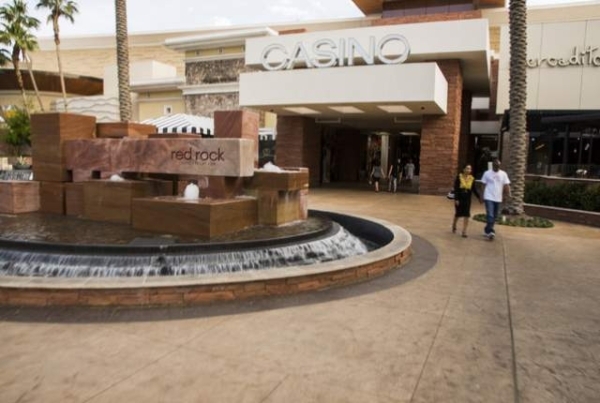Analyst finds locals casino business on an upswing
One analyst decided to escape the mind-numbing overload of last week's Global Gaming Expo and check out the resurgent Las Vegas locals gaming market.
Thomas Allen of Morgan Stanley told investors he liked what he saw.
"General managers appeared optimistic around growing momentum in the market," Allen wrote in a research report Monday.
He cited factors Station Casinos and Boyd Gaming Corp. have cited in recent quarterly results, such as benefiting from the Strip and an upswing in Southern Nevada economic indicators.
"Property managers made constructive comments on the locals market recovery with most properties seeing growth in (casino) play," Allen said.
The Clark County markets are having a decent gaming revenue production year. Combined, the locals sector is up 3.1 percent through September, according to the Gaming Control Board. Individually, North Las Vegas is up 3.74 percent, the Boulder Strip — which includes Henderson — is up 3.7 percent, and the unincorporated balance of Clark County is up 2.42 percent.
Quarterly numbers for the two dominant companies in the locals market have made investors happy. Station Casinos said its net revenue grew 4 percent in the second quarter while cash flow increased for the 17th straight three-month period. Boyd Gaming grew revenue 3.5 percent in the second quarter and cash flow was up 17 percent.
Allen visited all areas of the valley to sample the market. He told investors the properties "are more differentiated than one appreciates."
Morgan Stanley offers investment advice on just one of the locals operators, Boyd Gaming, which is traded publicly on the New York Stock Exchange. The company operates Sam's Town and the Coast Casinos brands, as well as three properties downtown.
In addition to Station Casinos — which has 19 large and small casinos throughout the Las Vegas Valley — other locals operators include American Casino & Entertainment Properties, which owns the two Arizona Charlie's casinos; Cannery Resorts, which operates the two Cannery properties and the privately held Aliante Hotel-Casino and the Rampart.
There are also locals-tourist hybrids, such as Michael Gaughan's South Point Casino and the off-Strip Silver Sevens, which is owned by Affinity Gaming.
The competitive environment among the locals market is "rational, with no meaningful changes in promotional spending," Allen said. The properties, however, are expanding their nongaming amenities.
Station Casinos undertook a $55 million capital improvement effort at its flagship Red Rock Resort and Green Valley Ranch Resort to upgrade various nongaming aspects of the properties, such as new restaurants and hotel rooms.
Boyd Gaming, which also operates in southern and Midwest regional market, is adding nongaming attractions throughout its casino portfolio. A large portion of the effort is being directed to the company's Las Vegas properties.
Allen said the nongaming attractions often have lower margins and cost more to operate, but they are amenities that will attract customers.
Regional gaming markets, while still far below their peak gaming revenue reporting years, have been slowly climbing back. Allen said the Las Vegas locals business has lagged behind. Collectively in 2004, the market was 19 percent below its 2007 peak year of $2.6 billion in gaming revenue.
Surprisingly, several locals-oriented casinos receive 40 percent to 50 percent of their business from the tourist market. Allen told investors the locals business is "more of a tourism market than one appreciates." In several of the hotel-casinos he visited, group bookings ranged from 10 percent to 55 percent of the room nights.
"This highlights (that) Las Vegas locals properties benefit from outside travel much more than U.S. regional casinos," Allen said.
Annual hotel occupancy hovers at more than 90 percent, But average daily room rates vary significantly depending on the calendar.
Allen said the future driver of the locals gaming business will be construction of new Strip developments. Timelines are still influx on the two major projects — the proposed Alon property on the former New Frontier site and Genting Berhad's $4 billion Resorts World Las Vegas.
Allen said there were currently 51,000 construction workers in Las Vegas, 54 percent less than in 2006. Both Strip projects would employ 7,000 workers each, he said.
"New construction should be a major tailwind, though there remains little activity," Allen said.
Howard Stutz's Inside Gaming column appears Wednesdays and Sundays. He can be reached at hstutz@reviewjournal.com or 702-477-3871. Find on Twitter: @howardstutz




























